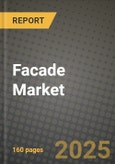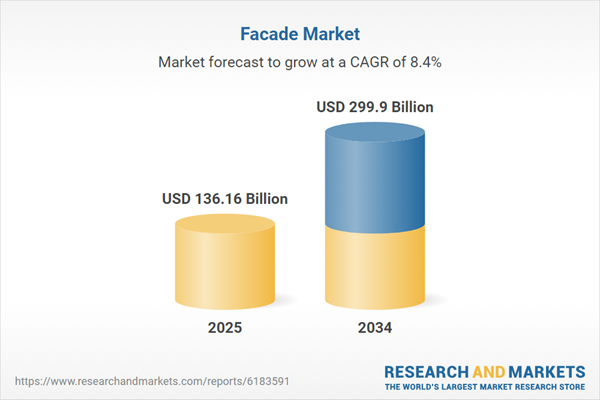Facade Market
The facade market spans unitized and stick curtain walls, window wall, rainscreen cladding, ventilated façades, double-skin envelopes, and retrofit over-clad systems integrating glazing, metal, stone, terracotta, fiber-cement, high-pressure laminates, and emerging bio-based panels. Demand is propelled by energy-code stringency, decarbonization targets, and urban densification - pushing envelope designs to balance thermal performance, solar control, daylighting, acoustics, fire safety, and embodied-carbon goals while preserving architectural expression. Specification increasingly favors high-selectivity low-E coatings, warm-edge spacers, thermal breaks, pressure-equalized cavities, and tested fire-barrier details; advanced options include dynamic glazing, PV-integrated skins, vacuum IG, closed-cavity façades, and parametric shading. Value is migrating from components to systemized delivery: early supplier involvement, digital engineering (BIM/digital twins), and DfMA/industrialized assembly compress schedules and reduce interface risk. Retrofit is a structural growth vein as owners pursue envelope-first energy upgrades and comfort in aging stock via prefabricated panels and secondary glazing. Competitive intensity is high among integrated façade contractors, fabricators, and system houses; differentiation hinges on tested assemblies, quality assurance, logistics, and ability to execute complex geometry at scale. Headwinds include input-cost volatility (aluminum, glass), skilled-labor constraints, façade fire regulations, and procurement fragmentation. Winning strategies pair robust mock-ups and certification with transparent EPDs, circularity plans (cullet/aluminum loops), and performance guarantees tied to airtightness and in-situ testing.Facade Market Key Insights
- Retrofit as the demand flywheel: Deep-energy renovations, comfort upgrades, and code-triggered replacements elevate over-clad and window-wall-to-curtain-wall conversions; prefabricated cassettes and panelized systems minimize tenant disruption and unlock performance gains with predictable cost-in-use.
- Performance-by-assembly, not part: Whole-system U-values, SHGC, condensation resistance, air/water tightness, acoustics, and verified fire-stop continuity drive specs; mock-ups (visual/structural/AW ratings) and site tests reduce litigation risk and speed approvals.
- Industrialized façades cut risk: DfMA, unitized fabrication, and just-in-time kitting shift work off-site, easing labor constraints and elevating quality; crane-optimized modules and repeatable nodes improve safety and schedule certainty on tall or complex sites.
- Dynamic and adaptive envelopes: Electrochromic/thermochromic glazing, operable vents, and parametric shading integrate with BMS to flatten peaks and improve glare control; occupant overrides and commissioning protocols are critical for acceptance.
- Materials under a carbon lens: Low-carbon aluminum (inert anodes/renewable power), recycled content, cullet recovery, and bio-based claddings support ESG targets; durability, reparability, and end-of-life design temper green-premium debates.
- Fire and resilience fundamentals: Non-combustible claddings, tested systems, cavity barriers, and fire-safe insulation are non-negotiable; wind-borne debris, seismic drift, and flood detailing increasingly feature in multi-hazard envelopes.
- Digital engineering as a moat: BIM-to-fabrication, clash-free interfaces, and digital twins for maintenance create traceability from sticker to service life; QR-tagged components streamline O&M, warranty claims, and future refurb cycles.
- Supply chain orchestration wins: Securing coating slots, spacer/IG capacity, and extrusion die lead times - paired with multi-sourcing and logistics buffers - protects schedules; integrated players offer single-point responsibility prized by developers.
- Façade as an energy asset: BIPV spandrels, rack-mounted PV canopies, and thermal-active façades add revenue or energy savings; calibrated daylighting cuts lighting loads and drives wellness scores in leases.
- Compliance and documentation currency: EPDs, third-party certifications, acoustics/thermal reports, and robust O&Ms are decisive in tenders; transparent testing histories and sample rooms build specifier trust and de-risk procurement.
Facade Market Reginal Analysis
North America
Energy codes, electrification, and wellness-driven leasing push high-performance envelopes with low-E stacks, warm-edge spacers, and improved thermal breaks. Unitized curtain wall dominates mid/high-rise; retrofit programs unlock panelized over-clads for offices, schools, and multifamily. Coastal and transit-adjacent projects emphasize laminated acoustics, corrosion resistance, and hurricane/impact criteria. Contractors with strong mock-up/test records and fast-track logistics outperform amid labor constraints.Europe
Renovation-first policy, strict fire regulations, and mature passive-house practices accelerate triple glazing, ventilated façades, and thermally improved aluminum/wood-aluminum hybrids. Heritage contexts spur slimline secondary glazing and reversible over-clads. Circularity expectations are high - EPDs, recycled aluminum, and cullet programs influence awards. Northern markets prioritize ultra-low U-values; southern markets optimize solar control and shading to cap cooling loads.Asia-Pacific
Hyper-urbanization and super-tall pipelines fuel demand for unitized systems and complex geometries. Hot-humid and hot-dry zones require solar-selective coatings, corrosion-resistant hardware, and robust seals; cold regions adopt triple/vacuum IG. Regional giants scale automated fabrication and coating capacity, enabling rapid custom runs. Government green-building programs and developer brand positioning spur smart/dynamic glazing pilots and BIPV façades in premium segments.Middle East & Africa
Extreme solar exposure, dust, and large diurnal swings drive spectrally selective coatings, deep shading, and sand-resistant gaskets. Premium commercial hubs deploy double-skin and dynamic glazing to manage glare and peaks; water management and maintenance access are critical design considerations. Fire-safe assemblies and tested cavity barriers are scrutinized in approvals. Reliable supply and skilled installation partners determine delivery success across dispersed geographies.South & Central America
Economic cyclicality creates a barbell market: value-engineered stick systems for mainstream builds and premium unitized façades for Grade-A offices and hospitality. Solar control, laminated acoustics, and moisture management are central in dense urban corridors. Local fabrication capacity is expanding with automated lines and regional coating partnerships. Public retrofits (schools/healthcare) and green labels encourage envelope upgrades with documented performance and long warranties.Facade Market Segmentation
By Product
- Ventilated
- Curtain Walls
- Non-Ventilated
- Others
By End-use
- Commercial
- Residential
- Industrial
Key Market players
Permasteelisa Group, Enclos Corporation, Schüco International KG, Kawneer Company, Inc., YKK AP Inc., Apogee Enterprises (Harmon), Oldcastle BuildingEnvelope (OBE), Yuanda China Holdings, Hydro Building Systems (WICONA, Technal), Reynaers Aluminium, AluK Group, seele GmbH, Focchi Group, Josef Gartner GmbH, Saint-Gobain Building GlassFacade Market Analytics
The report employs rigorous tools, including Porter’s Five Forces, value chain mapping, and scenario-based modelling, to assess supply-demand dynamics. Cross-sector influences from parent, derived, and substitute markets are evaluated to identify risks and opportunities. Trade and pricing analytics provide an up-to-date view of international flows, including leading exporters, importers, and regional price trends.Macroeconomic indicators, policy frameworks such as carbon pricing and energy security strategies, and evolving consumer behaviour are considered in forecasting scenarios. Recent deal flows, partnerships, and technology innovations are incorporated to assess their impact on future market performance.
Facade Market Competitive Intelligence
The competitive landscape is mapped through proprietary frameworks, profiling leading companies with details on business models, product portfolios, financial performance, and strategic initiatives. Key developments such as mergers & acquisitions, technology collaborations, investment inflows, and regional expansions are analyzed for their competitive impact. The report also identifies emerging players and innovative startups contributing to market disruption.Regional insights highlight the most promising investment destinations, regulatory landscapes, and evolving partnerships across energy and industrial corridors.
Countries Covered
- North America - Facade market data and outlook to 2034
- United States
- Canada
- Mexico
- Europe - Facade market data and outlook to 2034
- Germany
- United Kingdom
- France
- Italy
- Spain
- BeNeLux
- Russia
- Sweden
- Asia-Pacific - Facade market data and outlook to 2034
- China
- Japan
- India
- South Korea
- Australia
- Indonesia
- Malaysia
- Vietnam
- Middle East and Africa - Facade market data and outlook to 2034
- Saudi Arabia
- South Africa
- Iran
- UAE
- Egypt
- South and Central America - Facade market data and outlook to 2034
- Brazil
- Argentina
- Chile
- Peru
Research Methodology
This study combines primary inputs from industry experts across the Facade value chain with secondary data from associations, government publications, trade databases, and company disclosures. Proprietary modeling techniques, including data triangulation, statistical correlation, and scenario planning, are applied to deliver reliable market sizing and forecasting.Key Questions Addressed
- What is the current and forecast market size of the Facade industry at global, regional, and country levels?
- Which types, applications, and technologies present the highest growth potential?
- How are supply chains adapting to geopolitical and economic shocks?
- What role do policy frameworks, trade flows, and sustainability targets play in shaping demand?
- Who are the leading players, and how are their strategies evolving in the face of global uncertainty?
- Which regional “hotspots” and customer segments will outpace the market, and what go-to-market and partnership models best support entry and expansion?
- Where are the most investable opportunities - across technology roadmaps, sustainability-linked innovation, and M&A - and what is the best segment to invest over the next 3-5 years?
Your Key Takeaways from the Facade Market Report
- Global Facade market size and growth projections (CAGR), 2024-2034
- Impact of Russia-Ukraine, Israel-Palestine, and Hamas conflicts on Facade trade, costs, and supply chains
- Facade market size, share, and outlook across 5 regions and 27 countries, 2023-2034
- Facade market size, CAGR, and market share of key products, applications, and end-user verticals, 2023-2034
- Short- and long-term Facade market trends, drivers, restraints, and opportunities
- Porter’s Five Forces analysis, technological developments, and Facade supply chain analysis
- Facade trade analysis, Facade market price analysis, and Facade supply/demand dynamics
- Profiles of 5 leading companies - overview, key strategies, financials, and products
- Latest Facade market news and developments
Additional Support
With the purchase of this report, you will receive:- An updated PDF report and an MS Excel data workbook containing all market tables and figures for easy analysis.
- 7-day post-sale analyst support for clarifications and in-scope supplementary data, ensuring the deliverable aligns precisely with your requirements.
- Complimentary report update to incorporate the latest available data and the impact of recent market developments.
This product will be delivered within 1-3 business days.
Table of Contents
Companies Mentioned
- Permasteelisa Group
- Enclos Corporation
- Schüco International KG
- Kawneer Company Inc.
- YKK AP Inc.
- Apogee Enterprises (Harmon)
- Oldcastle BuildingEnvelope (OBE)
- Yuanda China Holdings
- Hydro Building Systems (WICONA Technal)
- Reynaers Aluminium
- AluK Group
- seele GmbH
- Focchi Group
- Josef Gartner GmbH
- Saint-Gobain Building Glass
Table Information
| Report Attribute | Details |
|---|---|
| No. of Pages | 160 |
| Published | November 2025 |
| Forecast Period | 2025 - 2034 |
| Estimated Market Value ( USD | $ 136.16 Billion |
| Forecasted Market Value ( USD | $ 299.9 Billion |
| Compound Annual Growth Rate | 8.4% |
| Regions Covered | Global |
| No. of Companies Mentioned | 15 |









